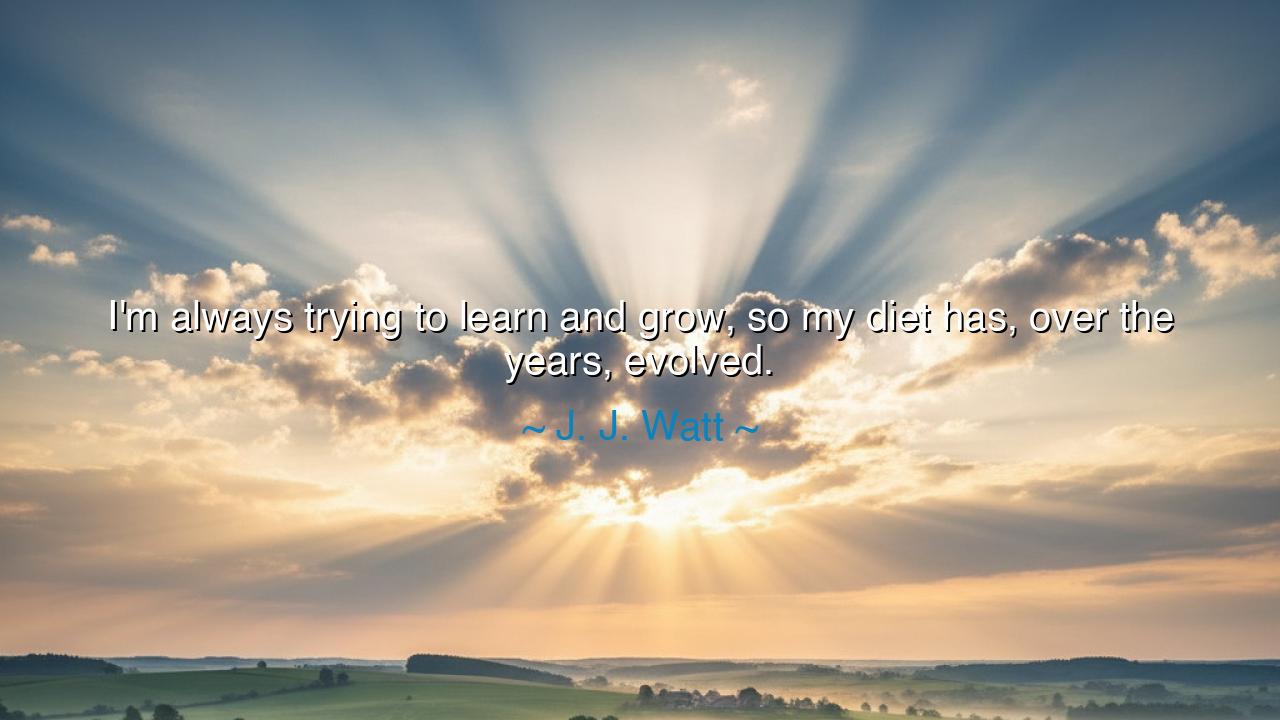
I'm always trying to learn and grow, so my diet has, over the






In the journey of life, where the pursuit of strength and wisdom intertwines, the path to true growth is not linear. It is an evolution, a continual process of learning, adapting, and becoming. J. J. Watt speaks to this profound truth when he says, "I’m always trying to learn and grow, so my diet has, over the years, evolved." These words are not merely about food; they are a reflection of the deeper, timeless principle that in all things—whether it be our body, mind, or spirit—growth is a continuous journey. The process of evolution is a dynamic, ever-changing force, shaping us with each decision, each experience, and each act of wisdom we embrace.
In the ancient traditions, the great warriors and philosophers knew that to grow was to constantly seek improvement, not just in the mind, but in the body as well. The Spartans, for example, did not view their diet as a fixed, rigid system but as a flexible framework that supported their physical prowess and mental clarity. Their meals were simple but purposeful, designed to fuel their bodies for battle and endurance. They understood that true strength came not from indulgence but from balance—from the ability to adapt their nutrition to the changing demands of life and war. In much the same way, J. J. Watt speaks of the evolution of his diet, a commitment to growth that mirrors the ancient warriors' pursuit of both physical and spiritual development.
The ancient Greeks, those philosophers of wisdom and strength, often spoke of the need for balance in all aspects of life. Hippocrates, the father of medicine, understood that food was not merely for pleasure but for nourishment—a means by which we could cultivate both the body and the soul. "Let food be thy medicine," he said, for he knew that the way we nourish ourselves shapes not just our physical health, but our ability to think, to reflect, and to evolve. J. J. Watt echoes this wisdom in his own evolving approach to diet. His words remind us that our relationship with food is not static; it must grow and change as we do. What nourishes us today may not be what sustains us tomorrow, and this is part of the great, organic cycle of life.
Consider the great Alexander the Great, who, though driven by conquest, was not blind to the importance of nourishment. His diet, though simple, was chosen for its ability to provide the energy needed for battle and leadership. Yet, even he was constantly evolving, adapting to the needs of his ever-changing environment. Alexander would often adjust his diet based on the climate, the availability of food, and the demands of his troops. This ability to adapt—to grow, evolve, and change—was key to his success. J. J. Watt's approach to his diet reflects this same understanding: that as we grow, we must constantly adapt our choices to the shifting demands of our bodies and lives.
The teachings of the ancient Stoics, particularly Marcus Aurelius, also reinforce the importance of evolution in all things. For Aurelius, growth was not about remaining fixed or rigid in one's ways but about embracing the flow of life and adjusting to its currents. In his meditations, he wrote often of the importance of self-reflection and the need to continually seek improvement. He recognized that true wisdom came not from being stubborn in one’s ways, but from the ability to evolve, to adapt, and to learn. J. J. Watt’s statement about his evolving diet reflects this Stoic principle—his openness to change and growth, to continually refining his approach to health, mirrors the Stoic ideal of lifelong learning and adaptation.
From this, we learn a critical lesson: growth is not a destination but a journey. Just as the great minds and warriors of the past understood that strength lies not in perfection but in the willingness to evolve, so must we approach our own lives. Our diet, our health, our very existence, must be seen as part of a process of continual improvement. The key to a fulfilling life is not in rigidly adhering to old patterns but in the ability to adjust, to grow, and to evolve with the demands of time and circumstance. J. J. Watt’s commitment to learning and growth in his diet is a modern reflection of this ancient wisdom. It is a reminder that true strength comes not from static perfection but from the constant flow of adaptation and self-improvement.
So, as we walk our own paths, let us embrace the evolution of our bodies, minds, and spirits. Let us not be trapped by rigid diets, old habits, or outdated beliefs. Instead, let us honor the wisdom of the ancients, who understood that growth is an ever-changing, organic process. Like J. J. Watt, let us commit to learning and evolving in all aspects of our lives, continually adapting to the needs of our bodies and souls. In this journey of constant improvement, we will find not only strength but true fulfillment—the kind that comes from honoring the process of becoming, ever-growing, ever-changing, and ever-evolving.






AAdministratorAdministrator
Welcome, honored guests. Please leave a comment, we will respond soon